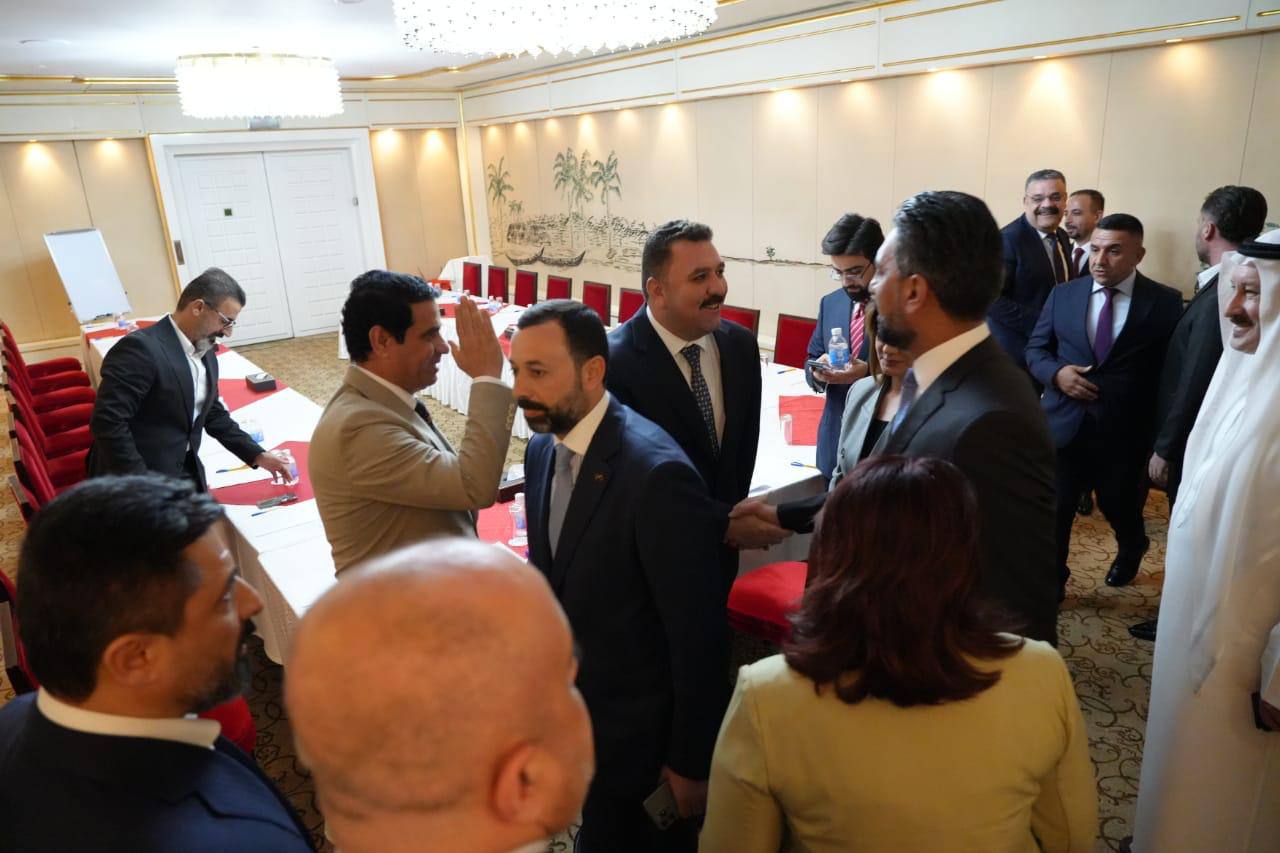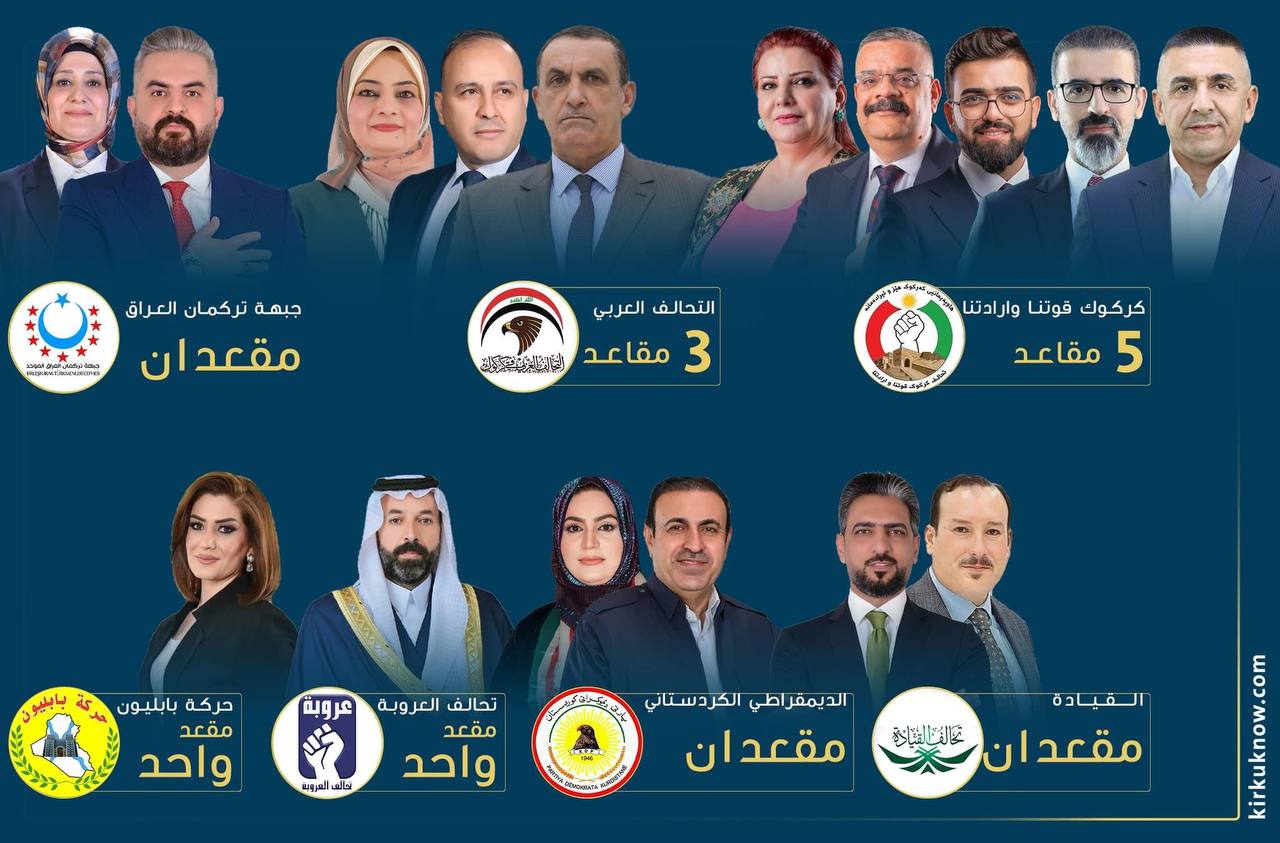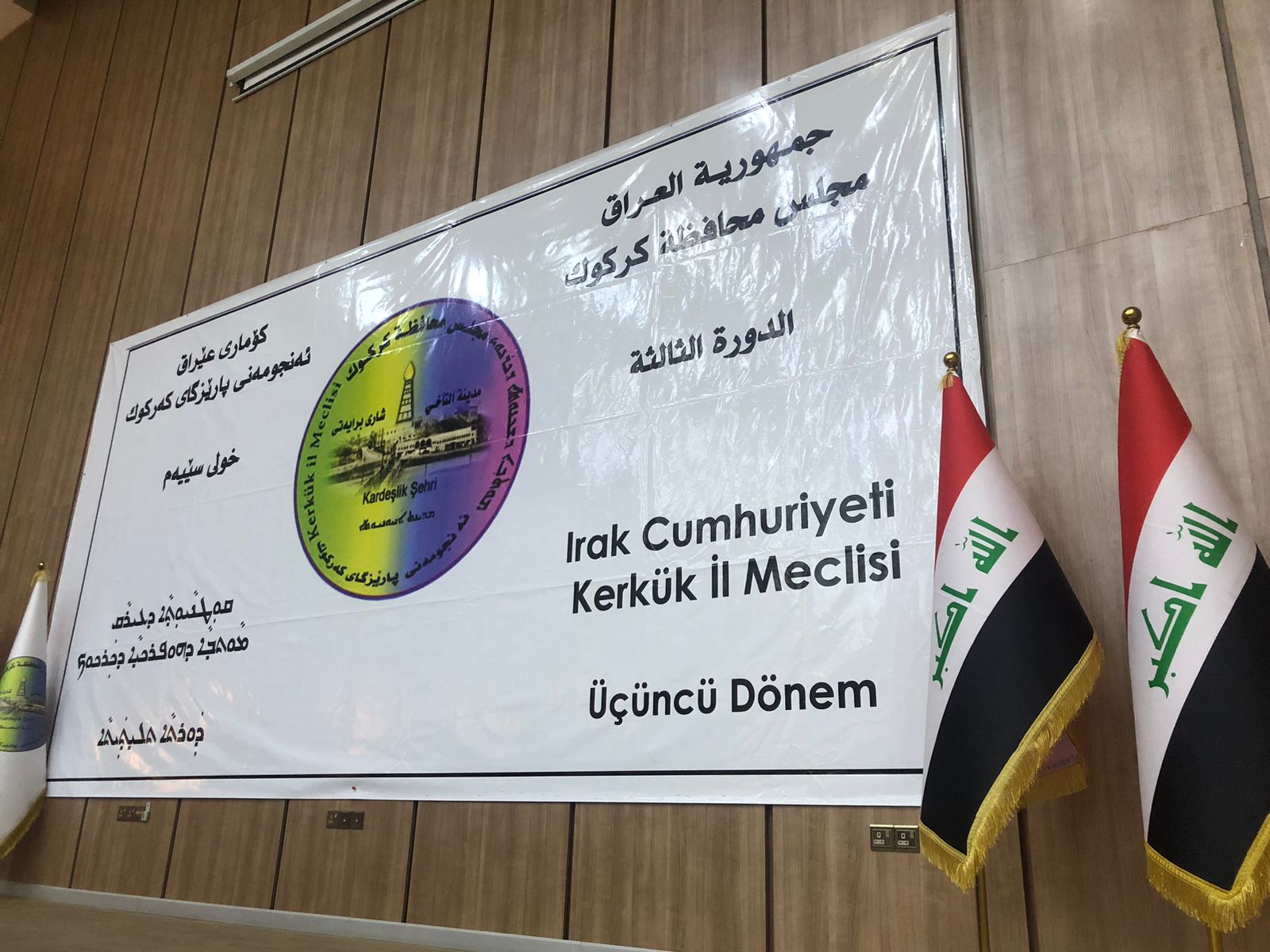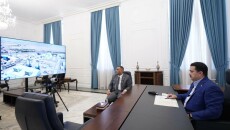The Arab coalition in Kirkuk considered the provincial council session that resulted in the formation of the local administration as "treason" and decided, along with the Iraqi Turkmen Front ITF and other opposition blocs, to resort to the judiciary.
The Kirkuk governor's election and the provincial council's head came in a session held late on Saturday night, August 10, at the Rashid Hotel in the Iraqi capital, Baghdad, in the absence of Arab, Turkmen, and Kurdish blocs.
In the session attended by nine out of 16 members, Rebwar Taha from the Patriotic Union of Kurdistan PUK was elected as Kirkuk Governor. In contrast, Mohammed Ibrahim Al-Hafez from the Leadership Alliance (of the Arab component) was elected as the head of the council. Ibrahim Al-Tamimi (brother of Mohammed Tamim, the Iraqi Deputy Prime Minister - from the Arab component) was elected as the deputy governor for technical affairs. Angel Zia was elected as the council’s rapporteur.
The nine members participating in the meeting were five members from the Patriotic Union of Kurdistan, two members from the Leadership Alliance, one member from the Arab Alliance, and a member of the Christian quota from the Babylon bloc. Three members from the Arab Alliance, two from the ITF, and two of the Kurdistan Democratic Party KDP boycotted the session.
Rakan Saeed Al-Jubouri, head of the Arab Alliance bloc in the provincial council, published a statement at dawn on Sunday, August 11, in which he announced his rejection of the results of the Baghdad session, which he said was held without his knowledge as the oldest head of the council, and considered it a violation of the law due to the failure to take into account the principle of consensus and the exclusion of some parties in forming the local government. Parwin Fateh, the second oldest council member, chaired the council session in Baghdad.
Al-Jubouri said in a clarification that what happened was a "theft" of the votes and rights of the Arab component, which they insisted on and did not give up over the past years.
"We worked hard for eight months to obtain your entitlements in Kirkuk and will not give them up... What happened today was presented to us eight months ago," referring to the positions granted to the Arab component.
He said, addressing the Arab members participating in the session from the Leadership and Arabism blocs, that they "betrayed" their people, their component, and their voters, and called on citizens to support the Arab coalition, which he considered "the majority representative," stressing their intention to resort to legal and judicial procedures.
We will resort to legal and judicial procedures
The Arab coalition has been demanding for months the appointment of al-Jubouri as governor, who was assigned to the position by former Prime Minister Haider al-Abadi following the events of October 16, 2017, when he was serving as deputy governor.
Hours before the Baghdad meeting, the Arab coalition published a statement signed by the members of the six Arab groups - the Arab coalition, the leadership, and Arabism - stressing the unity of the Arab position.
In response to the criticism directed at him, Zahir Anwar Al-Asi, a member of the provincial council from the Arabism bloc, published a letter on social media that included the names of 19 positions in Kirkuk province that were decided in favor of his coalition during the negotiations.
The positions included the position of the mayor of Daquq, the directors of the sub-districts of Riyadh, Rashad, Al-Abbasi, and Al-Zab, in addition to the Kirkuk police chief, two assistants to the governor, two advisors and directors of departments in the province.
During the Baath regime, most of the key administrative positions in Kirkuk were in the hands of the Arab component without holding any elections. After 2003, the Kurds assumed the top executive posts until 2017.
Abdul Rahman Mustafa, a Kurd, was the first governor of Kirkuk, after the provincial council elections in 2005. In 2011, Najmadin Karim, a leader of PUK, was elected governor of Kirkuk by the same council. After six years, he was removed by the Iraqi parliament.

The Baghdad session did not decide on several senior positions, including the position of deputy governor for administrative affairs and deputy head of the provincial council. According to previous statements by members of the winning blocs, the governor and council head will be rotated between Arabs and Kurds after two years, though no official evidence was published.
The leadership of the ITF bloc, which holds two seats in the provincial council, described the Baghdad meeting in a statement on Sunday, August 11, as a “clear and explicit violation of the law,” and decided to resort to the judiciary.
Sawsan Jadou, the Turkmen member of the Kirkuk provincial council, indicated in a brief statement published today that the Turkmen Front intends to resort to the judiciary to seek justice.
In a press conference held on August 11, Hassan Turan, the head of the ITF, stressed the rejection of the results of the provincial council meeting and the adoption of legal and judicial means because the process violated the provincial council elections law.
Under the provincial council elections law No. 12 of 2018, power is shared with fair representation to ensure the participation of the components of the province regardless of the election results, according to Article 35 of the provincial council elections law regarding Kirkuk province.
The northern, oil-rich city of Kirkuk is home to about 1,77 million Kurds, Turkmen, and Arabs. Located 238 kilometers north of Baghdad, Kirkuk is an ethnically mixed province and has long been at the center of disputes between the federal government in Baghdad and the Erbil-based Kurdistan Regional Government KRG.
The new governor of Kirkuk will be a governor for Kurds, Arabs, Turkmen, Christians
The Turkmen representative in the Iraqi parliament, Gharib Askar, who attended the negotiations to form the local government in Baghdad, responded with a brief statement and published a letter to the criticisms and indicated that "the rights of the Turkmen to political positions were established according to an agreement between the leaders of the components of Kirkuk."
The order included the names of 18 positions granted to the Turkmen, including the deputy chairman of the provincial council, the deputy governor, the assistant, and advisor to the governor, the mayor of the center, the Kirkuk police chief assistant, the directors of the sub-districts of Laylan, Taza and Yaychi, five directors of departments and some other positions.
According to provincial law, August 10 was the last date for electing candidates for the positions of the council chairman, the governor, and their deputies, given that 30 days have passed since the first session was held in Kirkuk.
The formation of the local government in Kirkuk has been postponed since the provincial council elections were held on December 18, 2023, due to disagreements between the blocs, especially between the Kurds and Arabs, over assuming the position of governor.
The Kurdistan Democratic Party KDP, which also did not participate in the Baghdad meeting, stressed through Hussein Majeed, the head of the bloc in the provincial council, that they were unaware of a meeting inside or outside the provincial council building.

The Kurdish component, with seven seats, has been insisting since last December provincial elections that the position of governor is the right of the Kurds, specifically the Patriotic Union of Kurdistan which was holding the position till October 2017, while the Arabs, led by the Arab Alliance headed by Rakan Saeed, who was holding the position since 2018 up to last December elections, were seeking to retain the position, while the Turkmen as the third ethnicity in Iraq proposes to rotate the position among the three main components of the province.
Rebwar Taha said in a statement after the election as governor of Kirkuk that "the new governor of Kirkuk will be the governor of the Kurds, Arabs, Turkmen, Christians and all categories and segments of Kirkuk without discrimination."
According to the laws, the President of the Republic must issue a decree appointing the governor within 15 days.
Since February 2024, a series of official and unofficial meetings have been held between the components of Kirkuk, some of which were headed by the Iraqi Prime Minister, Mohammed Shia al-Sudani, which resulted in the formation of a coalition that includes all the blocs, without reaching an agreement on the distribution of positions, including the position of governor.
After 2003, and based on a project proposed by the late Jalal Talabani, the former Iraqi President and former Secretary of the PUK, it was decided to distribute administrative positions: 32 percent for each of the Kurds, Arabs, and Turkmen, in addition to allocating 4 percent for the Christian component.
On July 28, 2009, Kirkuk Provincial Council approved the project yet it has not included all positions.
The fate of Kirkuk and the disputed territories is linked to the implementation of Article 140 of the Iraqi Constitution endorsed in 2005, which includes three stages: normalization, census, and referendum but up to the present it has not been fully implemented.






